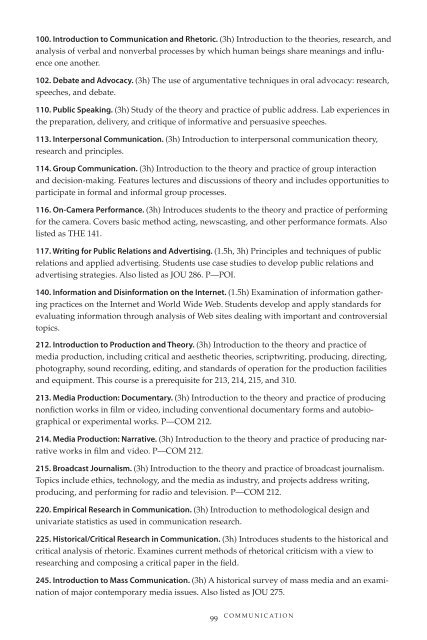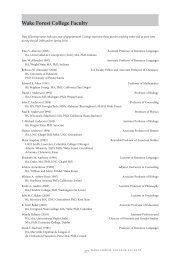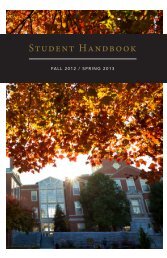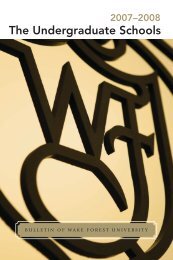theundergraduateschoo ls - Wake Forest University
theundergraduateschoo ls - Wake Forest University
theundergraduateschoo ls - Wake Forest University
Create successful ePaper yourself
Turn your PDF publications into a flip-book with our unique Google optimized e-Paper software.
100. Introduction to Communication and Rhetoric. (3h) Introduction to the theories, research, and<br />
analysis of verbal and nonverbal processes by which human beings share meanings and influence<br />
one another.<br />
102. Debate and Advocacy. (3h) The use of argumentative techniques in oral advocacy: research,<br />
speeches, and debate.<br />
110. Public Speaking. (3h) Study of the theory and practice of public address. Lab experiences in<br />
the preparation, delivery, and critique of informative and persuasive speeches.<br />
113. Interpersonal Communication. (3h) Introduction to interpersonal communication theory,<br />
research and principles.<br />
114. Group Communication. (3h) Introduction to the theory and practice of group interaction<br />
and decision-making. Features lectures and discussions of theory and includes opportunities to<br />
participate in formal and informal group processes.<br />
116. On-Camera Performance. (3h) Introduces students to the theory and practice of performing<br />
for the camera. Covers basic method acting, newscasting, and other performance formats. A<strong>ls</strong>o<br />
listed as THE 141.<br />
117. Writing for Public Relations and Advertising. (1.5h, 3h) Principles and techniques of public<br />
relations and applied advertising. Students use case studies to develop public relations and<br />
advertising strategies. A<strong>ls</strong>o listed as JOU 286. P—POI.<br />
140. Information and Disinformation on the Internet. (1.5h) Examination of information gathering<br />
practices on the Internet and World Wide Web. Students develop and apply standards for<br />
evaluating information through analysis of Web sites dealing with important and controversial<br />
topics.<br />
212. Introduction to Production and Theory. (3h) Introduction to the theory and practice of<br />
media production, including critical and aesthetic theories, scriptwriting, producing, directing,<br />
photography, sound recording, editing, and standards of operation for the production facilities<br />
and equipment. This course is a prerequisite for 213, 214, 215, and 310.<br />
213. Media Production: Documentary. (3h) Introduction to the theory and practice of producing<br />
nonfiction works in film or video, including conventional documentary forms and autobiographical<br />
or experimental works. P—COM 212.<br />
214. Media Production: Narrative. (3h) Introduction to the theory and practice of producing narrative<br />
works in film and video. P—COM 212.<br />
215. Broadcast Journalism. (3h) Introduction to the theory and practice of broadcast journalism.<br />
Topics include ethics, technology, and the media as industry, and projects address writing,<br />
producing, and performing for radio and television. P—COM 212.<br />
220. Empirical Research in Communication. (3h) Introduction to methodological design and<br />
univariate statistics as used in communication research.<br />
225. Historical/Critical Research in Communication. (3h) Introduces students to the historical and<br />
critical analysis of rhetoric. Examines current methods of rhetorical criticism with a view to<br />
researching and composing a critical paper in the field.<br />
245. Introduction to Mass Communication. (3h) A historical survey of mass media and an examination<br />
of major contemporary media issues. A<strong>ls</strong>o listed as JOU 275.<br />
C O M M U N I C A T I O N<br />
99






